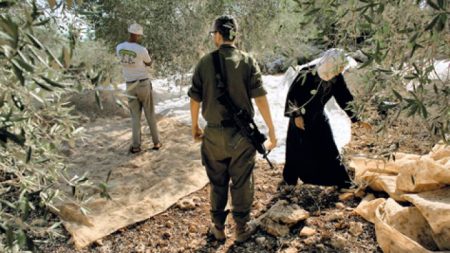(Photo: The harvest season represents a symbol to strengthen the steadfastness of the Palestinian farmers, and a refuge for impoverished families.)
The olive harvest, in the occupied West Bank, is considered to be as a Palestinian wedding which comes in October of every year; yet, it remains unsafe from the disturbances of Israeli settlers, whose attacks have increased, under the protection of the military.
The harvest season represents a symbol which strengthens the steadfastness of Palestinian farmers and a refuge for impoverished families, especially in the rural areas of the occupied West Bank, in spite of the renewed attacks against Palestinians.
Palestinian farmer Ahmed Abdullah, from Salfit and who owns several dunams of land planted with olive trees behind the wall said, according to Al Ray Palestinian Media Agency : “The harvest season is difficult this year because of the occupation and the ongoing practices of settlers.” Abdullah seemed worried about the coming days, as he prepares to reap the fruits of his lands located behind the apartheid wall.
He points out that great loss and catastrophe is constantly a risk among olive growers, as Israeli settlers steal and destroy the harvest, causing heavy production losses.
Ghassan Douglas, the official in charge of the settlement file for the northern West Bank, confirms that, each year, the olive harvest witnesses an intensification of attacks by settlers, which requires even more caution by farmers, especially those who tend lands near checkpoints and settlements.
For his part, farmer Naeem Khalil, from the village of Burin, south of Nablus, said: “I have dozens of olive trees [which] were providing for my needs, and my children who work sometimes, with me, within the unemployment program, but, as my land is located near [an Israeli settlement], many extremist settlers assault me in every season.”
Agricultural engineer Talal Baraka stressed that the number of olive trees planted for the current season amounts to about 12 million trees and about 80% of the planted lands in Palestine, where most of the olive groves are rain fed, excepting nearly 30 acres under irrigation and assisting irrigation, which is found in the southern provinces and the Jordan Valley.
Farmer Abu Amer from Deir Ballut village, harvested his olives early, and says: “Olive saves us a lot; it is a major income through the olive oil and the selling oil itself, it is like a green gold for us, where we do not have another source of income, but what [is] bothering us, at every season, is the settlers’ attacks and permits behind the wall where the inspection and humiliation [takes place at] the gates.”
In every season, farmers face many threats and attacks by Israeli forces and settlers who prevent them harvesting olives in the nearby streets used by settlers, or near the apartheid wall.
Many Palestinian farmers and their families avoid the settlers’ vehicles passing along the so-called “Samaria” street, for fear of being shot during the harvest, and ask voluntary groups of foreigners to help in the endeavor.
Israeli forces and settlers deliberately pursue a programmed policy to cause heavy losses for Palestinian farmers, during harvest season, or, at least restrict them, arresting, wounding and sometimes killing them, as they them out alone, on land where a few number of farmers are present.
Edited for the IMEMC by chris @ imemc.org
Also in Opinion/Analysis: 10/06/16 By Blaming Facebook for Palestinian Resistance, Israel Finds a New Partner in Crime

